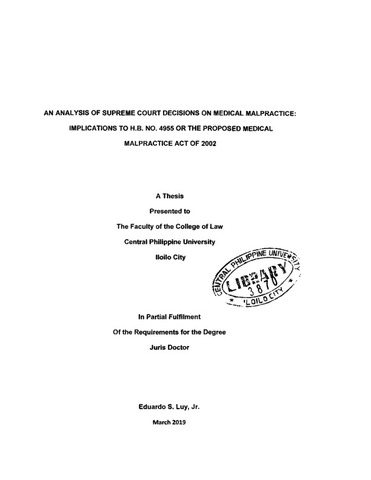An analysis of Supreme Court decisions on medical malpractice: Implications to H.B. No. 4955 or the Proposed Medical Malpractice Act of 2002
| dc.contributor.adviser | Alibogha, Salex E. | |
| dc.contributor.author | Luy, Eduardo S. Jr. | |
| dc.date.accessioned | 2021-07-01T00:55:20Z | |
| dc.date.available | 2021-07-01T00:55:20Z | |
| dc.date.issued | 2019 | |
| dc.identifier.citation | Luy, E. S., Jr. (2019). An analysis of Supreme Court decisions on medical malpractice: Implications to H.B. No. 4955 or the Proposed Medical Malpractice Act of 2002 (Unpublished postgraduate thesis). Central Philippine University, Jaro, Iloilo City. | en_US |
| dc.identifier.uri | https://hdl.handle.net/20.500.12852/1135 | |
| dc.description | Abstract only | en_US |
| dc.description.abstract | This study focused on examining the possibility and importance of a medical malpractice law in the country and explored the viability of enacting a medical malpractice law that would provide punishment for acts pertaining to medical malpractice committed by medical practitioners and other prohibited acts through examination of Supreme Court decisions, foreign court decisions, social legislations and results of studies done by various researchers on the criminalization of medical malpractice. It sought to answer questions of whether or not criminalizing medical malpractice would have a significant effect on quality of medical services rendered by medical professionals in the Philippines. Non-experimental qualitative content analysis approach was used as a research design, where the purposive samples were the empirical studies and court decisions regarding medical malpractice cases. The question raised was whether the passage of a medical malpractice act in the country would significantly improve the quality of medical services rendered by health professionals and to also to impose liability among those would commit a wrong in the pursuit of their medical profession. Results revealed that medical practitioners in the Philippines are not yet ready for the passage of a Medical Malpractice Bill and most of the health professionals strongly oppose for its enactment. Health practitioners contend that the enactment of Medical Malpractice Act would discourage people from pursuing a career in medicine because of the possible repercussions given the fact that being entrusted with the life and limb of a person is already insurmountable task. The implementation of the medical malpractice law may be a ground for people to take advantage of the opportunity to use the law as a way for them to cover acts that are beyond the scope of the law. | en_US |
| dc.format.extent | 58 leaves | en_US |
| dc.language.iso | en | en_US |
| dc.rights | Attribution-NonCommercial-NoDerivs 3.0 Philippines | * |
| dc.rights.uri | http://creativecommons.org/licenses/by-nc-nd/3.0/ph/ | * |
| dc.subject.ddc | Law Library 340.72 L979 2019 | en_US |
| dc.subject.lcsh | Medical personnel--Malpractice | en_US |
| dc.subject.lcsh | Malpractice | en_US |
| dc.subject.lcsh | Philippines. Supreme Court | en_US |
| dc.subject.lcsh | Court decisions and opinions | en_US |
| dc.subject.lcsh | Judgments | en_US |
| dc.subject.mesh | Malpractice | en_US |
| dc.title | An analysis of Supreme Court decisions on medical malpractice: Implications to H.B. No. 4955 or the Proposed Medical Malpractice Act of 2002 | en_US |
| dc.type | Thesis | en_US |
| dc.description.bibliographicalreferences | Includes bibliographical references | en_US |
| dc.contributor.chair | Bedona, Zacarias D. Jr. | |
| dc.contributor.department | College of Law | en_US |
| dc.description.degree | Juris Doctor | en_US |
| local.subject | Medical Malpractice Act of 2002 | en_US |
| local.subject | HB 4955 s. 2002 | en_US |
Files in this item
This item appears in the following Collection(s)
-
Juris Doctor [144]



